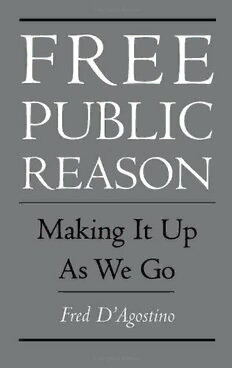
Free Public Reason: Making It Up As We Go PDF
259 Pages·1996·2.938 MB·English
Most books are stored in the elastic cloud where traffic is expensive. For this reason, we have a limit on daily download.
Preview Free Public Reason: Making It Up As We Go
Description:
Free Public Reason examines the idea of public justification, stressing its importance but also questioning the coherence of the concept itself. Although public justification is employed in the work of theorists such as John Rawls, Jeremy Waldron, Thomas Nagel, and others, it has received little attention on its own as a philosophical concept. In this book Fred D'Agostino shows that the concept is composed of various values, interests, and notions of the good, and that no ranking of these is possible. The notion of public justification itself is thus shown to be contestable. In demonstrating this, D'Agostino undermines many current political theories that rely on this concept. Having broken down the foundations of public justification, D'Agostino then offers an alternative model of how a workable consensus on its meaning might be reached through the interactions of a community of interpreters or delegates at a constitutional convention.
See more
The list of books you might like
Most books are stored in the elastic cloud where traffic is expensive. For this reason, we have a limit on daily download.
